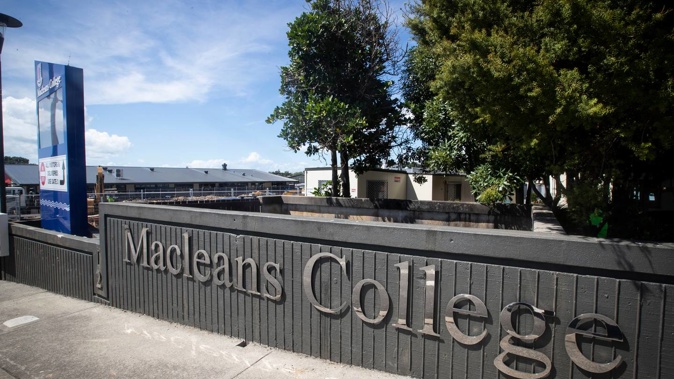
A school has been told to apologise to a student expelled for swearing at a teacher, with the Chief Ombudsman ruling the behaviour was not "gross misconduct".
Auckland's Macleans College, which prides itself on its high standard and culture, was advised to say sorry to the teenager after his family lodged a formal complaint.
The student had been expelled after telling a teacher to "f*** off" in an argument over an iPad.
The decision sends a message to all schools, with Chief Ombudsman Peter Boshier telling Macleans College the standards it sets are not those described in law - and that the Education Act trumps any school's rules.
The student, then aged 17, was expelled from the decile 9 state school in September 2019, just a few weeks before he finished Year 13 classes.
It followed a clash with a teacher over an iPad that the boy used for his schoolwork due to dysgraphia, or difficulty with writing. The school has strict rules about where and when devices can be used.
The student told the Herald he was in a common room doing an English assignment on the iPad when the teacher, his house leader, told him to get off the device.
He repeatedly refused, an argument followed, and the student says the teacher then tried to take his iPad - to which he responded "F*** off" and "don't touch my sh*t."
The student and family agree that CCTV did not show the teacher grabbing the iPad, although the student insists it happened.
A student can be expelled if they commit "gross misconduct that sets a harmful or dangerous example for other students". The school board's disciplinary committee decided his actions reached that threshold.
But his parents believed the punishment didn't fit the crime. They complained to the Ombudsman - who found the board was wrong and told it to apologise.
"I respect that Macleans has sought to establish its own rules and culture and that it holds its students to a high standard," Chief Ombudsman Peter Boshier said in an opinion sent to the family and school.
/cloudfront-ap-southeast-2.images.arcpublishing.com/nzme/Z3LEUFCGZ6CYXT2VR3FE6GYUOE.jpg)
"However, when it comes to suspension hearings and expulsions, school expectations are subservient to the Education Act 1989."
The High Court had been called on to define gross misconduct and found it to be behaviour that was "striking and reprehensible to a high degree".
A 1990 case involving Palmerston North Boys' High showed that while school boards had wide powers over administration and management, students could only be suspended or expelled for "gross misconduct" - not for "trivial infractions" of school rules.
"I am not saying [his] behaviour was a trivial infraction," the Ombudsman wrote.
"What I am saying is that whether his behaviour was gross misconduct is not subject to the board's own standards, as the board seems to be arguing. There is less flexibility in interpreting the threshold for gross misconduct than the board thinks."
He believed the student's behaviour was not gross misconduct as it was not "reprehensible to a high degree".
"This was a student, a teenager, shouting at a teacher with whom he had a strained relationship. This behaviour is not acceptable, but nor is it totally unexpected in a secondary school environment. It was not physically violent, nor did [the student] threaten physical violence. The harm to the other students or school is difficult to make out."
The student's behaviour required a "robust response" but there were many other options before expulsion.
/cloudfront-ap-southeast-2.images.arcpublishing.com/nzme/PT2YRDHHBWDR2UEESO6GFJKSHY.jpg)
Principal Steve Hargreaves said in his opinion the behaviour had been "striking and reprehensible" as there had not been a "verbal assault of this nature" in his 20 years' involvement with the school.
He understood a "harmful example" to mean that "if you allow these types of incidents ... and for there not to be seen to be justice to be done, that impacts the fabric of the school. It changes the nature of what students think is acceptable".
But following the Ombudsman's decision in May, Hargreaves and board chairman Richard Wilkie wrote to the family, saying they had been instructed to apologise.
The Ombudsman had found the board acted unreasonably, the boy's actions were not gross misconduct, and the "decision to expel him was therefore wrong", the letter said. The board "apologises for this wrongful decision" and for a flawed disciplinary hearing process.
The student's father told the Herald he was pleased the board had reviewed its processes, which would help ensure students were treated with fairness and transparency in the future.
But he was disappointed in the letter from the school, which he felt was merely "paying lip service" to an apology.
Hargreaves told the Herald the apology was "absolutely ... genuine".
"We wish [the student] and his family all the very best."
/cloudfront-ap-southeast-2.images.arcpublishing.com/nzme/63MGBSNPCMP4US23R5UEPDF2BI.jpg)
NZ School Trustees Association president Lorraine Kerr said currently parents could take a complaint to the Ombudsman or the Children's Commissioner if they were unhappy with the outcome of a disciplinary process.
The Government had also announced in 2018 it planned to establish local dispute resolution panels giving families another avenue to deal with complaints against school boards.
It was still unclear whether they would have the power to enforce their findings. No date had been set for when the panels would be implemented, and they were not funded in this year's Budget.
Education Law NZ barrister and solicitor Carol Anderson said a decision must not be pre-determined by school policies or breaking school rules - boards needed to consider behaviour on a scale of seriousness.
"Individual boards take a widely varying approach to 'gross misconduct'. Some decisions to exclude or expel are taken to the Ombudsman but many are not."
She said "the consequences of expulsion are significant" because an expelled student did not have to be accepted by another school. "In practice it usually means the end of the student's secondary education."
Take your Radio, Podcasts and Music with you









